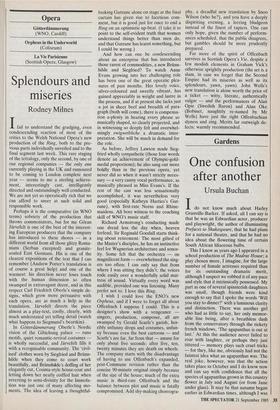Opera Gotterdammerung (WNO, Cardiff)
La Vie Parisienne (Scottish Opera, Glasgow)
Splendours and miseries
Rodney Milnes
Ifail to understand the grudging, even condescending reaction of most of the critics to the Welsh National Opera's new production of the Ring, both to the pre- vious parts individually unveiled and to the final segment last week. This rare staging of the tetralogy, only the second, by one of our regional companies ŌĆö the only one currently playing in the UK and rumoured to be coming to London complete next year ŌĆö seems to me a sterling achieve- ment, interestingly cast, intelligently directed and outstandingly well conducted. We are not yet so operatically rich that we can afford to sneer at such solid and responsible work.
Perhaps it is the comparative (in WNO terms) sobriety of the production that throws commentators, but for me G6ran Jarvefelt is one of the best of the interest- ing European producers that the company has introduced to these shores ŌĆö in a different world from all those glitzy Roma- nians (Serban excepted) and granite- souled East Germans. His is one of the clearest expositions of the text that I can remember (Andrew Porter's translation is of course a great help) and one of the wannest: his direction never loses touch with the human dimension so often swamped in extravagant decor, and in this respect Carl Friedrich Oberle's simple de- signs, which grow more persuasive with each opera, are as much a help as the translation. Jarvefelt directs the piece almost as a play-text, coolly, clearly, with much understated yet telling detail (watch what happens to Siegmund's bearskin).
In Gotterdammerung Oberle's Nordic vision of the Gibichung palace ŌĆö rune motifs, quiet romantic-revival costumes is wholly successful, and Jarvefelt fills it with a recognisable community. The 'civil- ised' clothes worn by Siegfried and Briinn- hilde when they come to court work beautifully, and Briinnhilde's doffing of her elegantly cut, Cosima-style house-coat and letting down her neatly coiffed hair when reverting to semi-divinity for the Immola- tion was just one of many affecting mo- ments. The idea of leaving a thoughtful- looking Gutrune alone on stage at the final curtain has given rise to facetious com- ment, but it is good just for once to end a Ring on an optimistic up-beat. (I take it to point to the self-evident truth that women understand things better than men do, and that Gutrune has learnt something, but I could be wrong.) And how can one be condescending about an enterprise that has introduced those rarest of commodities, a new Briinn- hilde and Siegfried? To watch Anne Evans growing into her challenging role has been one of the great operatic plea- sures of past months. Her lovely voice, silver-coloured and sweetly vibrant, has gained appreciably in weight and lustre in the process, and if at present she lacks just a jot in sheer beef and breadth of para- graph (both will come), there is compensa- tion a-plenty in hearing every phrase so musically shaped, so clearly projected, and in witnessing so deeply felt and overwhel- mingly ewigweibliche a dramatic inter- pretation. She will be much in detnand for the role.
As before, Jeffrey Lawton made Sieg- fried wholly sympathetic (those four words denote an achievement of Olympic-gold- medal proportions); he also sang out more boldly than in the previous opera, yet never did so when it wasn't strictly neces- sary ŌĆö a very canny vocal performance, as musically phrased as Miss Evans's. If the rest of the cast was less sensationally accomplished, it was nevertheless very good (especially Kathryn Harries's Gut- rune), with first-rate Norns and Rhine- maidens. All bore witness to the coaching skill of WNO's music staff.
Richard Armstrong's conducting made one dread less the day when, heaven forfend, Sir Reginald Goodall starts think- ing about retirement. The most gifted of the Master's disciples, he has an instinctive feel for Wagnerian architecture and sonor- ity. Some felt that the orchestra ŌĆö on magnificent form ŌĆö overwhelmed the sing- ers too often: I can only say that from where I was sitting they didn't: the voices rode easily over a wonderfully solid mat- tress of sound. Virtually every word was audible, provided one was listening. Many prefer not to. I love this Ring.
I wish I could love the ENO's new Orpheus, and if I were to forget all about Offenbach I suppose I could. This is a designer's show with a vengeance singers, production, composer, all are swamped by Gerald Scarfe's garish, hor- ribly unfunny drops and costumes, unfun- ny because even the best cartoons ŌĆö and Scarfe's are far, far from that ŌĆö amuse for only about five seconds: after five, ten, twenty minutes they are death on wheels. The company starts with the disadvantage of having to use Offenbach's expanded, post-Commune revision rather than the concise 90-minute original simply because of the size of the house; much of the extra music is third-rate Offenbach and the balance between plot and music is fatally compromised. Add shy-making choreogra- phy, a dreadful new translation by Snoo Wilson (who he?), and you have a deeply dispiriting evening, a leering bludgeon instead of the finest of rapiers. One can only hope, given the number of perform- ances scheduled, that the public disagrees, but gambles should be more prudently prepared.
Far more of the spirit of Offenbach survives in Scottish Opera's Vie, despite a few modish elements in Graham Vick's otherwise sprightly production (the set is a slum, in case we forget that the Second Empire had its miseries as well as its splendours, yawn, yawn). John Wells's new translation is alone worth the price of a ticket ŌĆö witty, literate, authentically vulgar ŌĆö and the performances of Alan Opie (Swedish Baron) and Alan Oke (Bobinet, naughtily re-named by Mr Wells) have just the right Offenbachian slyness and zing. Merits far outweigh de- fects: warmly recommended.














































 Previous page
Previous page